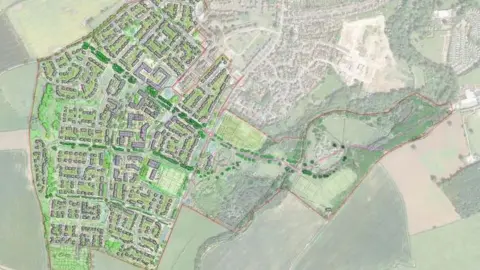Barracks sale paves way for 1,300 new homes
 Homes England
Homes EnglandA major housing development has moved forward following the sale of a vacant military site.
Homes England announced it had acquired the land at Ripon Barracks from the Ministry of Defence (MoD) on 12 June and would go ahead with plans to build 1,300 new homes.
The site, which includes Deverell Barracks, Claro Barracks and Laver Banks, is due to be vacated by the armed forces in 2026.
Homes England said the scheme, called Clotherholme, would include a new primary school, community centre and retail area "to create a vibrant new community".
Once completed, the development would increase Ripon's population by a fifth.
Critics have previously expressed concerns over the impact on infrastructure and the loss of historic military buildings.
Homes England said it would work together with the MoD to "honour the site's military past through appreciative design, landscaping and interpretive elements".
Prominent historical features, such as the linear parade ground layout and the original footpath network would be preserved and integrated.
'Unlocking underused land'
The development would be delivered in phases, with initial work beginning at the Deverell Barracks site to provide the first 150 new homes.
The remaining areas – Claro Barracks, Laver Banks, and the former Engineering Park – would be developed following the scheduled departure of the Royal Engineers to Marne Barracks on Catterick Garrison.
The government said that "unlocking underused public land" was "crucial" to tackling housing shortages.
The MoD's Defence Estate Optimisation project will see military sites that are no longer needed released for other uses.
Ripon Barracks played a role in both world wars. During World War One, the site was built as a convalescent camp for soldiers, and the famous poet Wilfred Owen was treated there.
Troops prepared for the D-Day landings at the camp in the 1940s and it was also a base during the Cold War.
Listen to highlights from North Yorkshire on BBC Sounds, catch up with the latest episode of Look North.
